International Business Operations
VerifiedAdded on 2020/01/07
|14
|4513
|335
Report
AI Summary
This assignment delves into various aspects of international business operations. It examines the social responsibility of international business, focusing on ethical considerations, environmental impact, and sustainable development. The assignment also explores service-ecosystem perspectives on value creation in international business. Furthermore, it discusses market entry strategies, emphasizing the importance of cultural perspective and trust building in cross-cultural business operations. Finally, the assignment touches upon green capability in shipping operations and knowledge connectivity for innovation within an international business context.
Contribute Materials
Your contribution can guide someone’s learning journey. Share your
documents today.
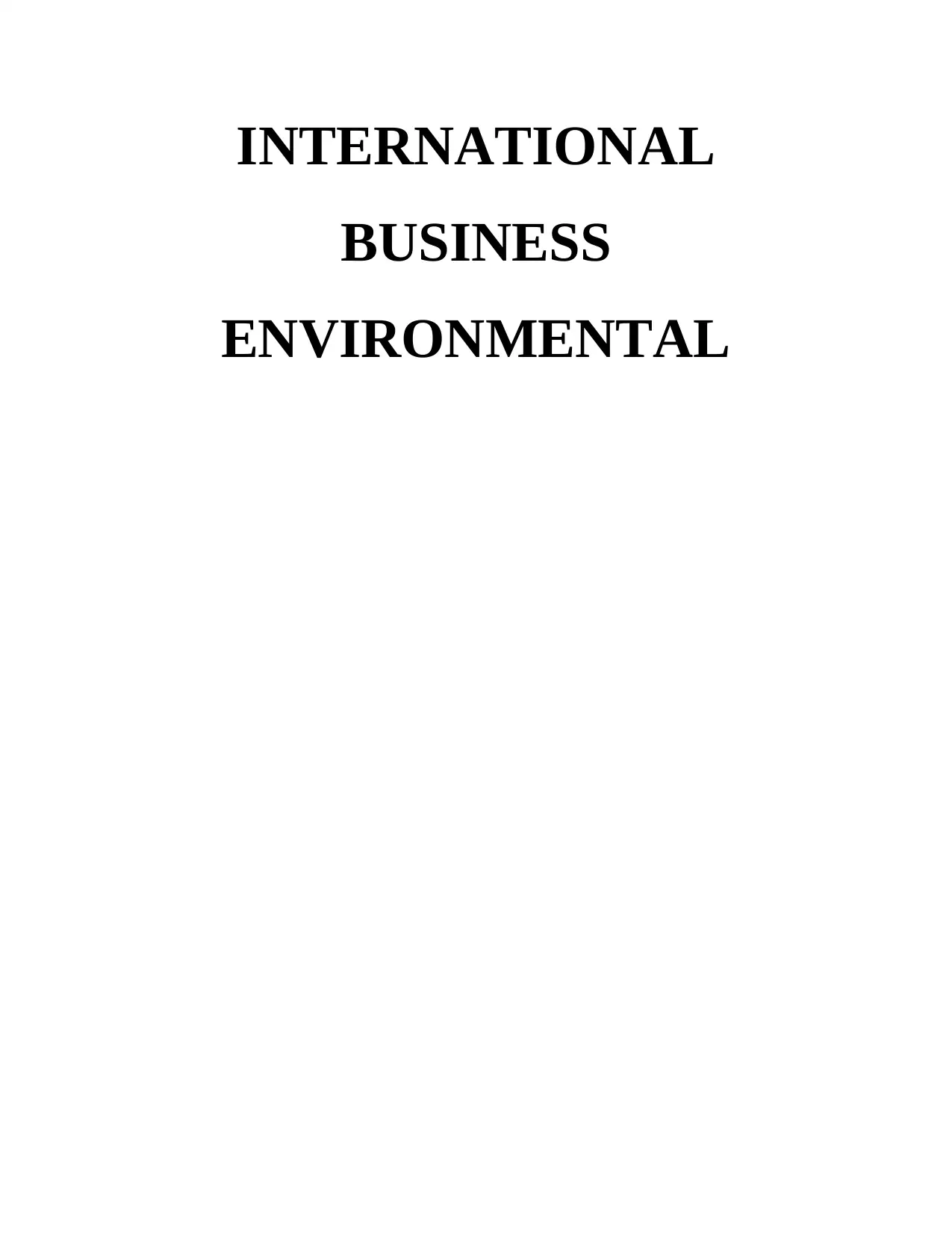
INTERNATIONAL
BUSINESS
ENVIRONMENTAL
BUSINESS
ENVIRONMENTAL
Secure Best Marks with AI Grader
Need help grading? Try our AI Grader for instant feedback on your assignments.
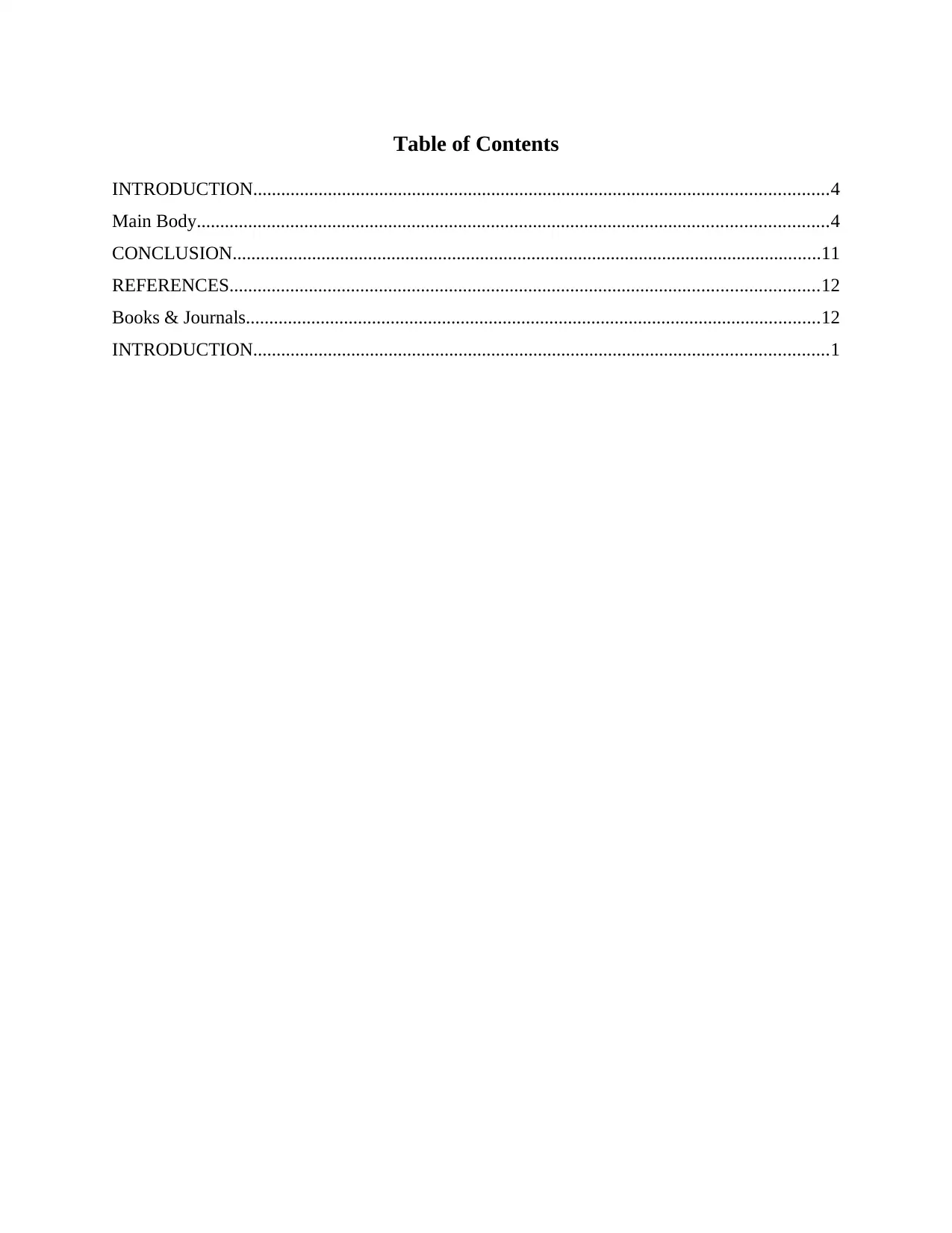
Table of Contents
INTRODUCTION...........................................................................................................................4
Main Body.......................................................................................................................................4
CONCLUSION..............................................................................................................................11
REFERENCES..............................................................................................................................12
Books & Journals...........................................................................................................................12
INTRODUCTION...........................................................................................................................1
INTRODUCTION...........................................................................................................................4
Main Body.......................................................................................................................................4
CONCLUSION..............................................................................................................................11
REFERENCES..............................................................................................................................12
Books & Journals...........................................................................................................................12
INTRODUCTION...........................................................................................................................1
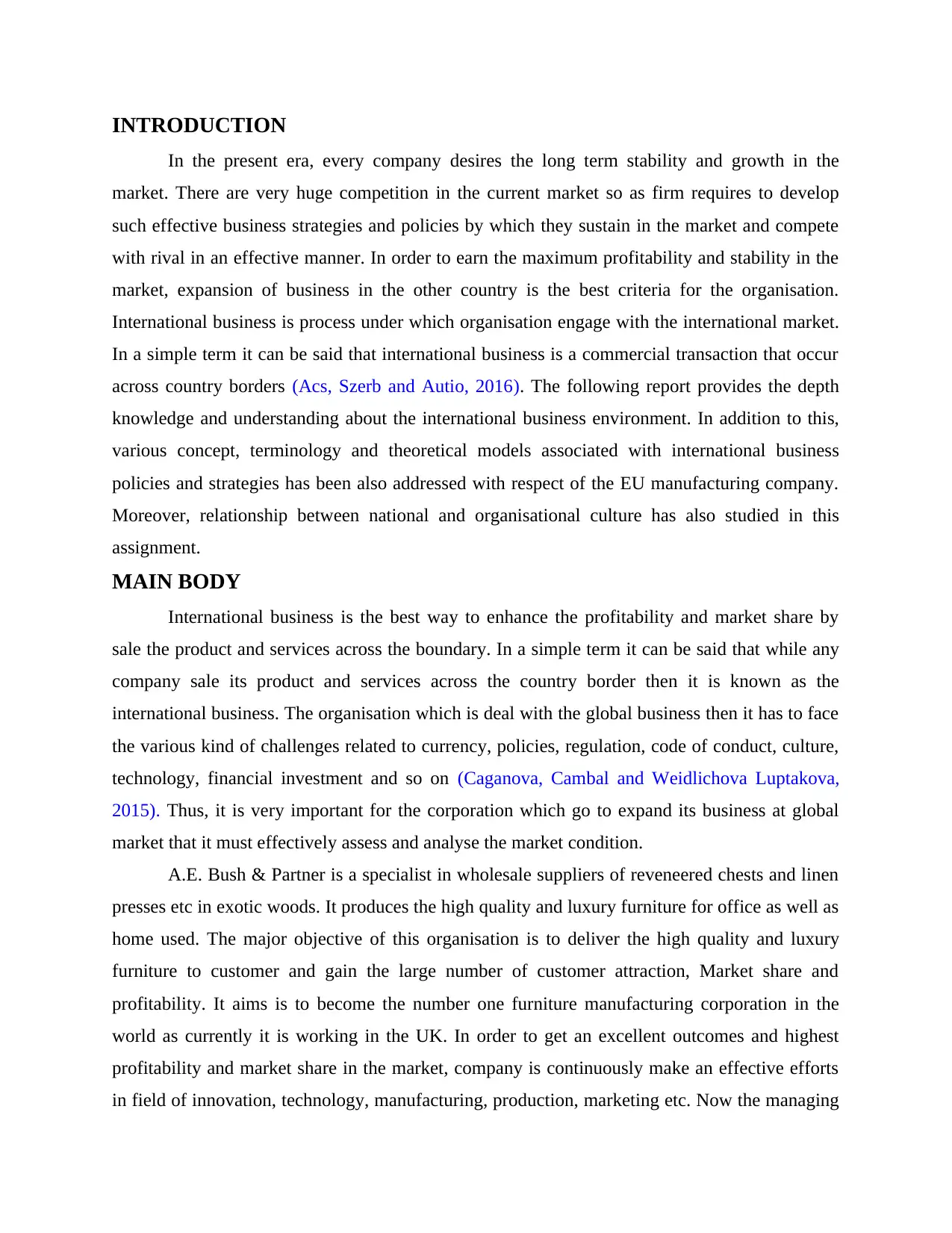
INTRODUCTION
In the present era, every company desires the long term stability and growth in the
market. There are very huge competition in the current market so as firm requires to develop
such effective business strategies and policies by which they sustain in the market and compete
with rival in an effective manner. In order to earn the maximum profitability and stability in the
market, expansion of business in the other country is the best criteria for the organisation.
International business is process under which organisation engage with the international market.
In a simple term it can be said that international business is a commercial transaction that occur
across country borders (Acs, Szerb and Autio, 2016). The following report provides the depth
knowledge and understanding about the international business environment. In addition to this,
various concept, terminology and theoretical models associated with international business
policies and strategies has been also addressed with respect of the EU manufacturing company.
Moreover, relationship between national and organisational culture has also studied in this
assignment.
MAIN BODY
International business is the best way to enhance the profitability and market share by
sale the product and services across the boundary. In a simple term it can be said that while any
company sale its product and services across the country border then it is known as the
international business. The organisation which is deal with the global business then it has to face
the various kind of challenges related to currency, policies, regulation, code of conduct, culture,
technology, financial investment and so on (Caganova, Cambal and Weidlichova Luptakova,
2015). Thus, it is very important for the corporation which go to expand its business at global
market that it must effectively assess and analyse the market condition.
A.E. Bush & Partner is a specialist in wholesale suppliers of reveneered chests and linen
presses etc in exotic woods. It produces the high quality and luxury furniture for office as well as
home used. The major objective of this organisation is to deliver the high quality and luxury
furniture to customer and gain the large number of customer attraction, Market share and
profitability. It aims is to become the number one furniture manufacturing corporation in the
world as currently it is working in the UK. In order to get an excellent outcomes and highest
profitability and market share in the market, company is continuously make an effective efforts
in field of innovation, technology, manufacturing, production, marketing etc. Now the managing
In the present era, every company desires the long term stability and growth in the
market. There are very huge competition in the current market so as firm requires to develop
such effective business strategies and policies by which they sustain in the market and compete
with rival in an effective manner. In order to earn the maximum profitability and stability in the
market, expansion of business in the other country is the best criteria for the organisation.
International business is process under which organisation engage with the international market.
In a simple term it can be said that international business is a commercial transaction that occur
across country borders (Acs, Szerb and Autio, 2016). The following report provides the depth
knowledge and understanding about the international business environment. In addition to this,
various concept, terminology and theoretical models associated with international business
policies and strategies has been also addressed with respect of the EU manufacturing company.
Moreover, relationship between national and organisational culture has also studied in this
assignment.
MAIN BODY
International business is the best way to enhance the profitability and market share by
sale the product and services across the boundary. In a simple term it can be said that while any
company sale its product and services across the country border then it is known as the
international business. The organisation which is deal with the global business then it has to face
the various kind of challenges related to currency, policies, regulation, code of conduct, culture,
technology, financial investment and so on (Caganova, Cambal and Weidlichova Luptakova,
2015). Thus, it is very important for the corporation which go to expand its business at global
market that it must effectively assess and analyse the market condition.
A.E. Bush & Partner is a specialist in wholesale suppliers of reveneered chests and linen
presses etc in exotic woods. It produces the high quality and luxury furniture for office as well as
home used. The major objective of this organisation is to deliver the high quality and luxury
furniture to customer and gain the large number of customer attraction, Market share and
profitability. It aims is to become the number one furniture manufacturing corporation in the
world as currently it is working in the UK. In order to get an excellent outcomes and highest
profitability and market share in the market, company is continuously make an effective efforts
in field of innovation, technology, manufacturing, production, marketing etc. Now the managing
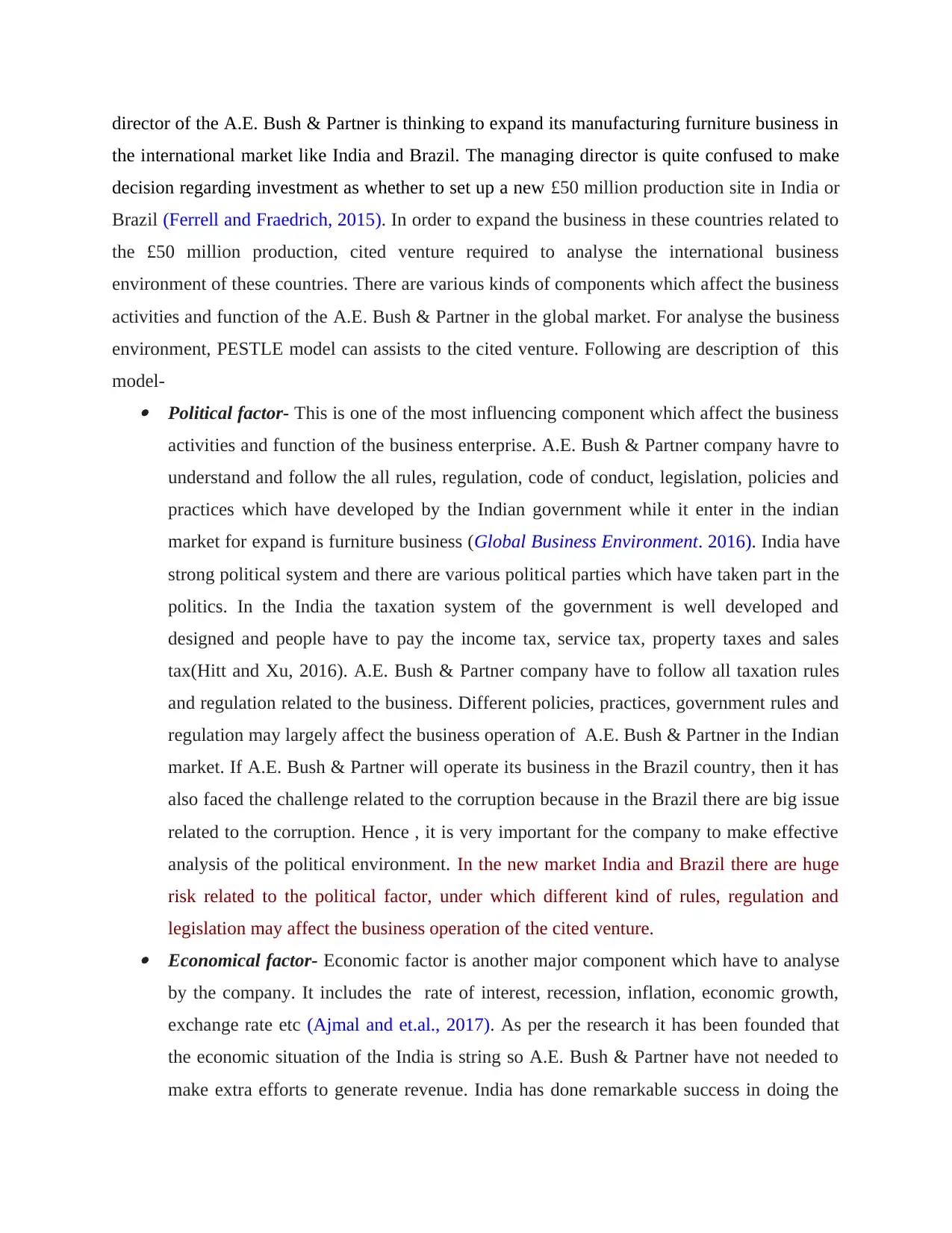
director of the A.E. Bush & Partner is thinking to expand its manufacturing furniture business in
the international market like India and Brazil. The managing director is quite confused to make
decision regarding investment as whether to set up a new £50 million production site in India or
Brazil (Ferrell and Fraedrich, 2015). In order to expand the business in these countries related to
the £50 million production, cited venture required to analyse the international business
environment of these countries. There are various kinds of components which affect the business
activities and function of the A.E. Bush & Partner in the global market. For analyse the business
environment, PESTLE model can assists to the cited venture. Following are description of this
model- Political factor- This is one of the most influencing component which affect the business
activities and function of the business enterprise. A.E. Bush & Partner company havre to
understand and follow the all rules, regulation, code of conduct, legislation, policies and
practices which have developed by the Indian government while it enter in the indian
market for expand is furniture business (Global Business Environment. 2016). India have
strong political system and there are various political parties which have taken part in the
politics. In the India the taxation system of the government is well developed and
designed and people have to pay the income tax, service tax, property taxes and sales
tax(Hitt and Xu, 2016). A.E. Bush & Partner company have to follow all taxation rules
and regulation related to the business. Different policies, practices, government rules and
regulation may largely affect the business operation of A.E. Bush & Partner in the Indian
market. If A.E. Bush & Partner will operate its business in the Brazil country, then it has
also faced the challenge related to the corruption because in the Brazil there are big issue
related to the corruption. Hence , it is very important for the company to make effective
analysis of the political environment. In the new market India and Brazil there are huge
risk related to the political factor, under which different kind of rules, regulation and
legislation may affect the business operation of the cited venture. Economical factor- Economic factor is another major component which have to analyse
by the company. It includes the rate of interest, recession, inflation, economic growth,
exchange rate etc (Ajmal and et.al., 2017). As per the research it has been founded that
the economic situation of the India is string so A.E. Bush & Partner have not needed to
make extra efforts to generate revenue. India has done remarkable success in doing the
the international market like India and Brazil. The managing director is quite confused to make
decision regarding investment as whether to set up a new £50 million production site in India or
Brazil (Ferrell and Fraedrich, 2015). In order to expand the business in these countries related to
the £50 million production, cited venture required to analyse the international business
environment of these countries. There are various kinds of components which affect the business
activities and function of the A.E. Bush & Partner in the global market. For analyse the business
environment, PESTLE model can assists to the cited venture. Following are description of this
model- Political factor- This is one of the most influencing component which affect the business
activities and function of the business enterprise. A.E. Bush & Partner company havre to
understand and follow the all rules, regulation, code of conduct, legislation, policies and
practices which have developed by the Indian government while it enter in the indian
market for expand is furniture business (Global Business Environment. 2016). India have
strong political system and there are various political parties which have taken part in the
politics. In the India the taxation system of the government is well developed and
designed and people have to pay the income tax, service tax, property taxes and sales
tax(Hitt and Xu, 2016). A.E. Bush & Partner company have to follow all taxation rules
and regulation related to the business. Different policies, practices, government rules and
regulation may largely affect the business operation of A.E. Bush & Partner in the Indian
market. If A.E. Bush & Partner will operate its business in the Brazil country, then it has
also faced the challenge related to the corruption because in the Brazil there are big issue
related to the corruption. Hence , it is very important for the company to make effective
analysis of the political environment. In the new market India and Brazil there are huge
risk related to the political factor, under which different kind of rules, regulation and
legislation may affect the business operation of the cited venture. Economical factor- Economic factor is another major component which have to analyse
by the company. It includes the rate of interest, recession, inflation, economic growth,
exchange rate etc (Ajmal and et.al., 2017). As per the research it has been founded that
the economic situation of the India is string so A.E. Bush & Partner have not needed to
make extra efforts to generate revenue. India has done remarkable success in doing the
Secure Best Marks with AI Grader
Need help grading? Try our AI Grader for instant feedback on your assignments.
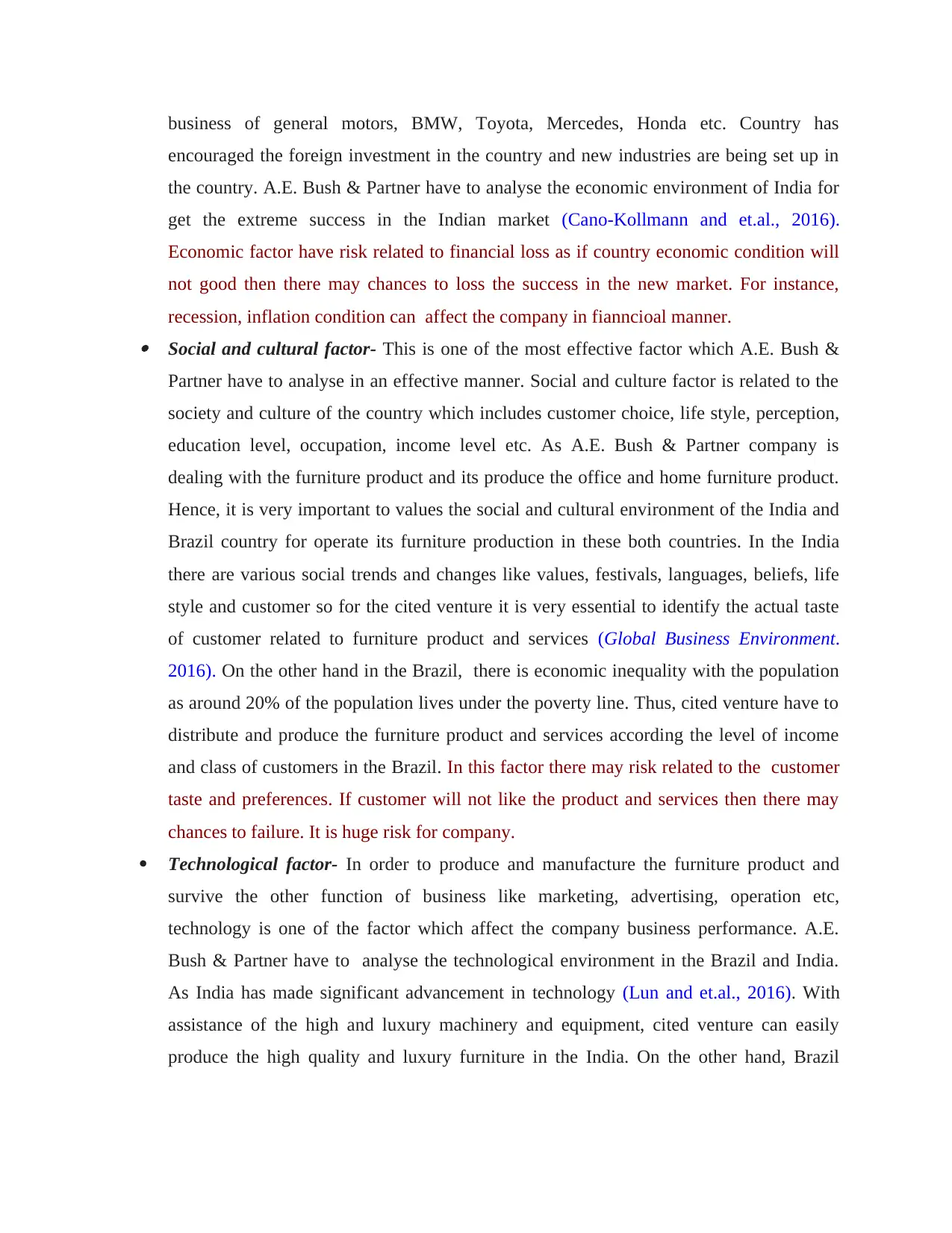
business of general motors, BMW, Toyota, Mercedes, Honda etc. Country has
encouraged the foreign investment in the country and new industries are being set up in
the country. A.E. Bush & Partner have to analyse the economic environment of India for
get the extreme success in the Indian market (Cano-Kollmann and et.al., 2016).
Economic factor have risk related to financial loss as if country economic condition will
not good then there may chances to loss the success in the new market. For instance,
recession, inflation condition can affect the company in fianncioal manner. Social and cultural factor- This is one of the most effective factor which A.E. Bush &
Partner have to analyse in an effective manner. Social and culture factor is related to the
society and culture of the country which includes customer choice, life style, perception,
education level, occupation, income level etc. As A.E. Bush & Partner company is
dealing with the furniture product and its produce the office and home furniture product.
Hence, it is very important to values the social and cultural environment of the India and
Brazil country for operate its furniture production in these both countries. In the India
there are various social trends and changes like values, festivals, languages, beliefs, life
style and customer so for the cited venture it is very essential to identify the actual taste
of customer related to furniture product and services (Global Business Environment.
2016). On the other hand in the Brazil, there is economic inequality with the population
as around 20% of the population lives under the poverty line. Thus, cited venture have to
distribute and produce the furniture product and services according the level of income
and class of customers in the Brazil. In this factor there may risk related to the customer
taste and preferences. If customer will not like the product and services then there may
chances to failure. It is huge risk for company.
Technological factor- In order to produce and manufacture the furniture product and
survive the other function of business like marketing, advertising, operation etc,
technology is one of the factor which affect the company business performance. A.E.
Bush & Partner have to analyse the technological environment in the Brazil and India.
As India has made significant advancement in technology (Lun and et.al., 2016). With
assistance of the high and luxury machinery and equipment, cited venture can easily
produce the high quality and luxury furniture in the India. On the other hand, Brazil
encouraged the foreign investment in the country and new industries are being set up in
the country. A.E. Bush & Partner have to analyse the economic environment of India for
get the extreme success in the Indian market (Cano-Kollmann and et.al., 2016).
Economic factor have risk related to financial loss as if country economic condition will
not good then there may chances to loss the success in the new market. For instance,
recession, inflation condition can affect the company in fianncioal manner. Social and cultural factor- This is one of the most effective factor which A.E. Bush &
Partner have to analyse in an effective manner. Social and culture factor is related to the
society and culture of the country which includes customer choice, life style, perception,
education level, occupation, income level etc. As A.E. Bush & Partner company is
dealing with the furniture product and its produce the office and home furniture product.
Hence, it is very important to values the social and cultural environment of the India and
Brazil country for operate its furniture production in these both countries. In the India
there are various social trends and changes like values, festivals, languages, beliefs, life
style and customer so for the cited venture it is very essential to identify the actual taste
of customer related to furniture product and services (Global Business Environment.
2016). On the other hand in the Brazil, there is economic inequality with the population
as around 20% of the population lives under the poverty line. Thus, cited venture have to
distribute and produce the furniture product and services according the level of income
and class of customers in the Brazil. In this factor there may risk related to the customer
taste and preferences. If customer will not like the product and services then there may
chances to failure. It is huge risk for company.
Technological factor- In order to produce and manufacture the furniture product and
survive the other function of business like marketing, advertising, operation etc,
technology is one of the factor which affect the company business performance. A.E.
Bush & Partner have to analyse the technological environment in the Brazil and India.
As India has made significant advancement in technology (Lun and et.al., 2016). With
assistance of the high and luxury machinery and equipment, cited venture can easily
produce the high quality and luxury furniture in the India. On the other hand, Brazil
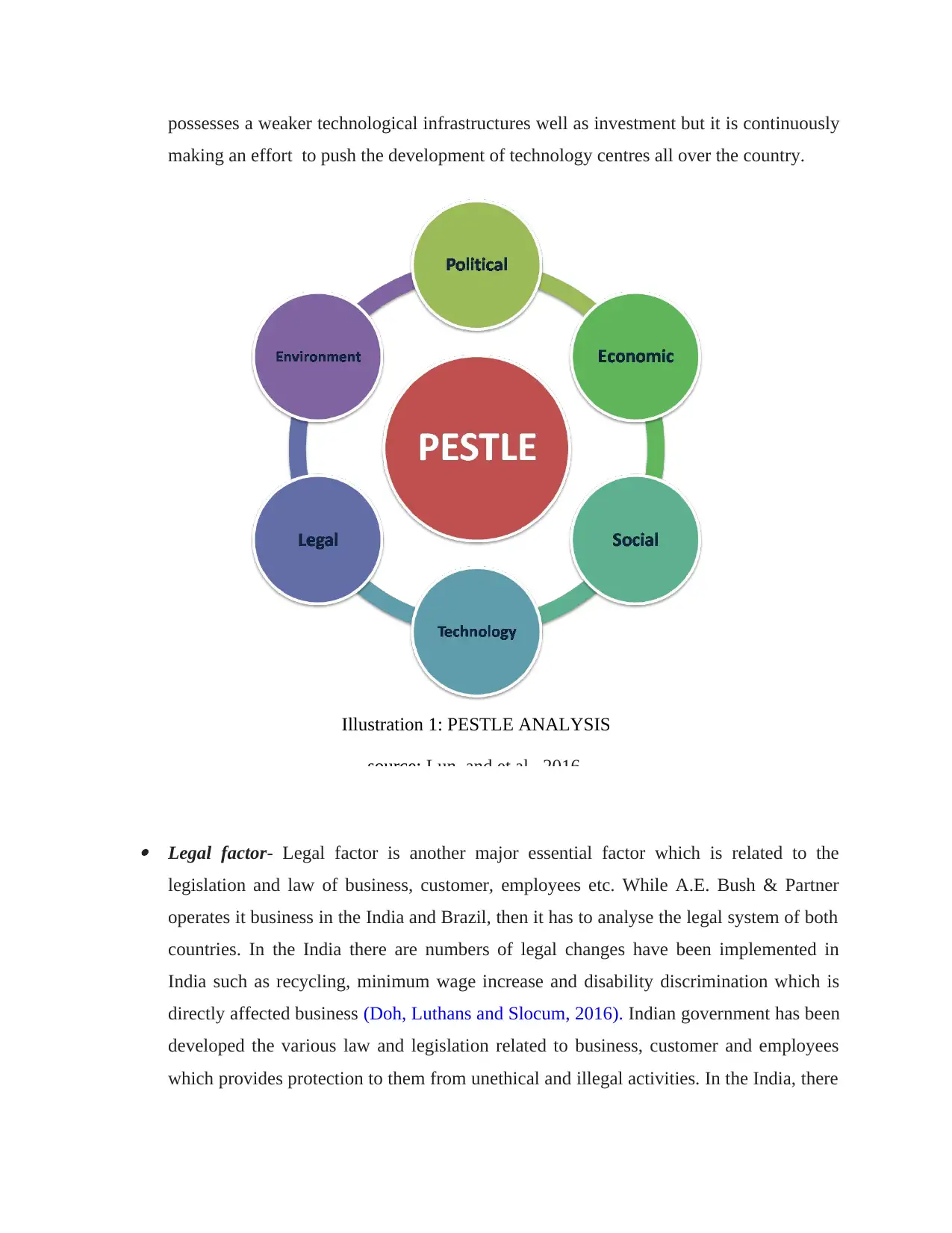
possesses a weaker technological infrastructures well as investment but it is continuously
making an effort to push the development of technology centres all over the country.
Legal factor- Legal factor is another major essential factor which is related to the
legislation and law of business, customer, employees etc. While A.E. Bush & Partner
operates it business in the India and Brazil, then it has to analyse the legal system of both
countries. In the India there are numbers of legal changes have been implemented in
India such as recycling, minimum wage increase and disability discrimination which is
directly affected business (Doh, Luthans and Slocum, 2016). Indian government has been
developed the various law and legislation related to business, customer and employees
which provides protection to them from unethical and illegal activities. In the India, there
Illustration 1: PESTLE ANALYSIS
source: Lun and et.al., 2016.
making an effort to push the development of technology centres all over the country.
Legal factor- Legal factor is another major essential factor which is related to the
legislation and law of business, customer, employees etc. While A.E. Bush & Partner
operates it business in the India and Brazil, then it has to analyse the legal system of both
countries. In the India there are numbers of legal changes have been implemented in
India such as recycling, minimum wage increase and disability discrimination which is
directly affected business (Doh, Luthans and Slocum, 2016). Indian government has been
developed the various law and legislation related to business, customer and employees
which provides protection to them from unethical and illegal activities. In the India, there
Illustration 1: PESTLE ANALYSIS
source: Lun and et.al., 2016.
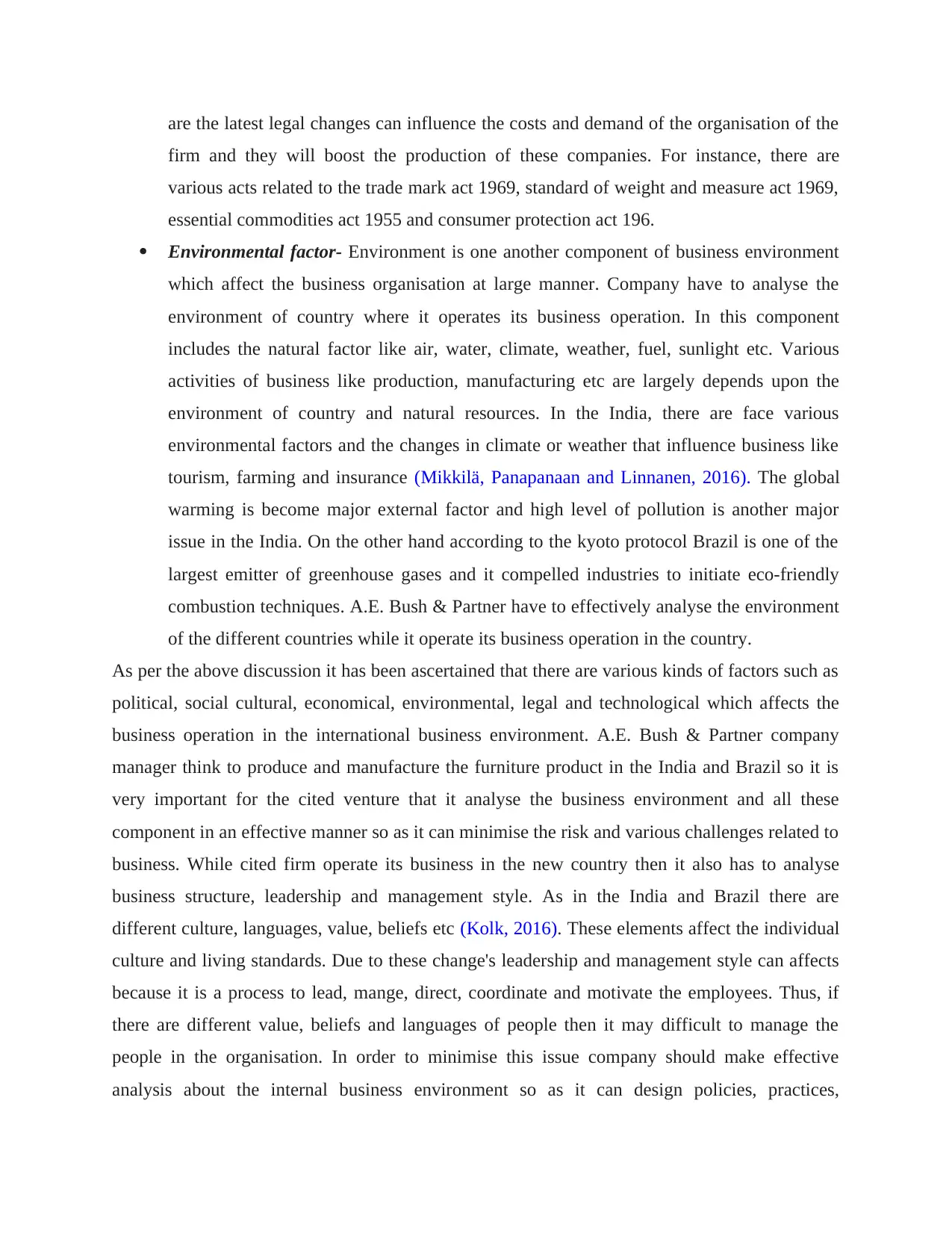
are the latest legal changes can influence the costs and demand of the organisation of the
firm and they will boost the production of these companies. For instance, there are
various acts related to the trade mark act 1969, standard of weight and measure act 1969,
essential commodities act 1955 and consumer protection act 196.
Environmental factor- Environment is one another component of business environment
which affect the business organisation at large manner. Company have to analyse the
environment of country where it operates its business operation. In this component
includes the natural factor like air, water, climate, weather, fuel, sunlight etc. Various
activities of business like production, manufacturing etc are largely depends upon the
environment of country and natural resources. In the India, there are face various
environmental factors and the changes in climate or weather that influence business like
tourism, farming and insurance (Mikkilä, Panapanaan and Linnanen, 2016). The global
warming is become major external factor and high level of pollution is another major
issue in the India. On the other hand according to the kyoto protocol Brazil is one of the
largest emitter of greenhouse gases and it compelled industries to initiate eco-friendly
combustion techniques. A.E. Bush & Partner have to effectively analyse the environment
of the different countries while it operate its business operation in the country.
As per the above discussion it has been ascertained that there are various kinds of factors such as
political, social cultural, economical, environmental, legal and technological which affects the
business operation in the international business environment. A.E. Bush & Partner company
manager think to produce and manufacture the furniture product in the India and Brazil so it is
very important for the cited venture that it analyse the business environment and all these
component in an effective manner so as it can minimise the risk and various challenges related to
business. While cited firm operate its business in the new country then it also has to analyse
business structure, leadership and management style. As in the India and Brazil there are
different culture, languages, value, beliefs etc (Kolk, 2016). These elements affect the individual
culture and living standards. Due to these change's leadership and management style can affects
because it is a process to lead, mange, direct, coordinate and motivate the employees. Thus, if
there are different value, beliefs and languages of people then it may difficult to manage the
people in the organisation. In order to minimise this issue company should make effective
analysis about the internal business environment so as it can design policies, practices,
firm and they will boost the production of these companies. For instance, there are
various acts related to the trade mark act 1969, standard of weight and measure act 1969,
essential commodities act 1955 and consumer protection act 196.
Environmental factor- Environment is one another component of business environment
which affect the business organisation at large manner. Company have to analyse the
environment of country where it operates its business operation. In this component
includes the natural factor like air, water, climate, weather, fuel, sunlight etc. Various
activities of business like production, manufacturing etc are largely depends upon the
environment of country and natural resources. In the India, there are face various
environmental factors and the changes in climate or weather that influence business like
tourism, farming and insurance (Mikkilä, Panapanaan and Linnanen, 2016). The global
warming is become major external factor and high level of pollution is another major
issue in the India. On the other hand according to the kyoto protocol Brazil is one of the
largest emitter of greenhouse gases and it compelled industries to initiate eco-friendly
combustion techniques. A.E. Bush & Partner have to effectively analyse the environment
of the different countries while it operate its business operation in the country.
As per the above discussion it has been ascertained that there are various kinds of factors such as
political, social cultural, economical, environmental, legal and technological which affects the
business operation in the international business environment. A.E. Bush & Partner company
manager think to produce and manufacture the furniture product in the India and Brazil so it is
very important for the cited venture that it analyse the business environment and all these
component in an effective manner so as it can minimise the risk and various challenges related to
business. While cited firm operate its business in the new country then it also has to analyse
business structure, leadership and management style. As in the India and Brazil there are
different culture, languages, value, beliefs etc (Kolk, 2016). These elements affect the individual
culture and living standards. Due to these change's leadership and management style can affects
because it is a process to lead, mange, direct, coordinate and motivate the employees. Thus, if
there are different value, beliefs and languages of people then it may difficult to manage the
people in the organisation. In order to minimise this issue company should make effective
analysis about the internal business environment so as it can design policies, practices,
Paraphrase This Document
Need a fresh take? Get an instant paraphrase of this document with our AI Paraphraser
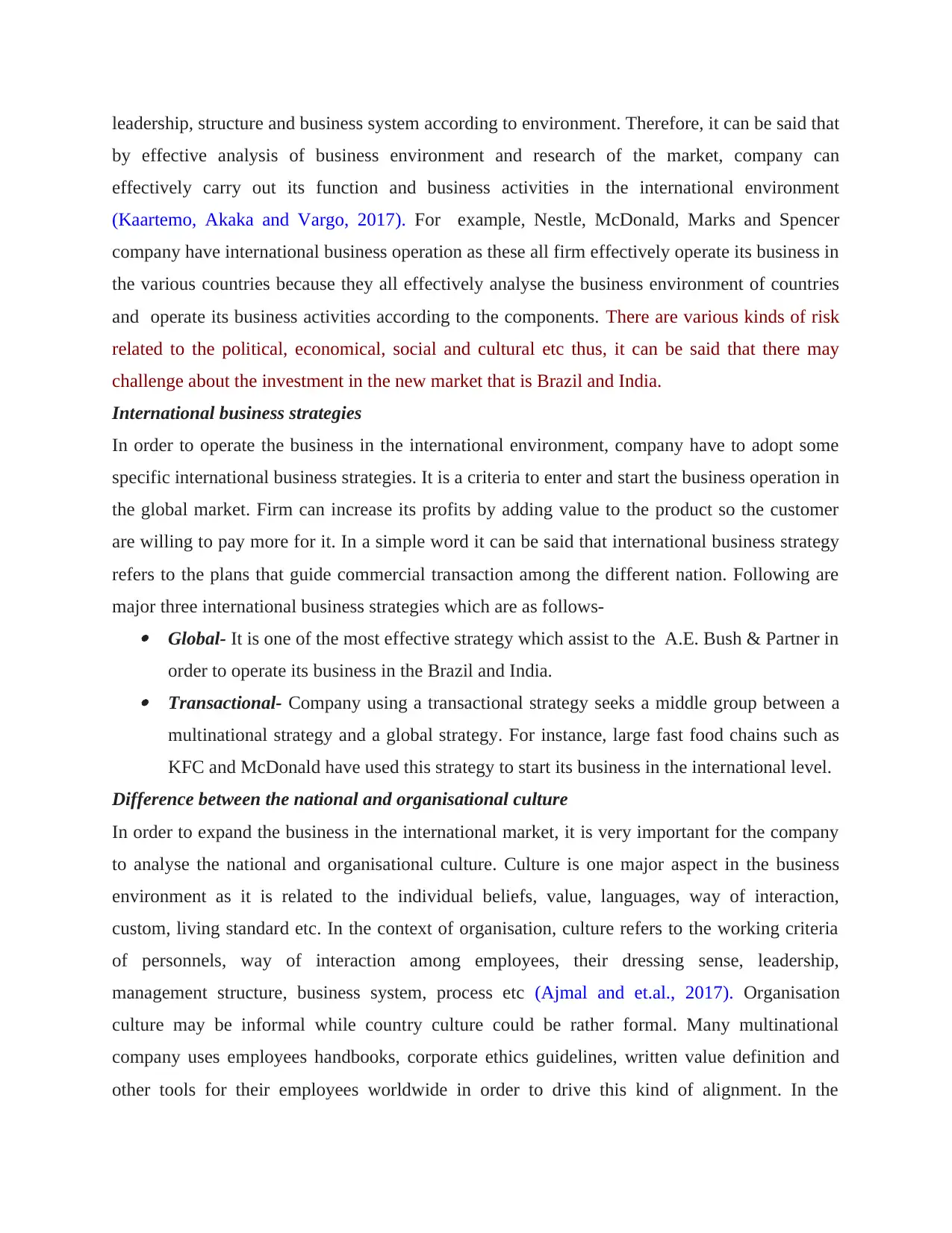
leadership, structure and business system according to environment. Therefore, it can be said that
by effective analysis of business environment and research of the market, company can
effectively carry out its function and business activities in the international environment
(Kaartemo, Akaka and Vargo, 2017). For example, Nestle, McDonald, Marks and Spencer
company have international business operation as these all firm effectively operate its business in
the various countries because they all effectively analyse the business environment of countries
and operate its business activities according to the components. There are various kinds of risk
related to the political, economical, social and cultural etc thus, it can be said that there may
challenge about the investment in the new market that is Brazil and India.
International business strategies
In order to operate the business in the international environment, company have to adopt some
specific international business strategies. It is a criteria to enter and start the business operation in
the global market. Firm can increase its profits by adding value to the product so the customer
are willing to pay more for it. In a simple word it can be said that international business strategy
refers to the plans that guide commercial transaction among the different nation. Following are
major three international business strategies which are as follows- Global- It is one of the most effective strategy which assist to the A.E. Bush & Partner in
order to operate its business in the Brazil and India. Transactional- Company using a transactional strategy seeks a middle group between a
multinational strategy and a global strategy. For instance, large fast food chains such as
KFC and McDonald have used this strategy to start its business in the international level.
Difference between the national and organisational culture
In order to expand the business in the international market, it is very important for the company
to analyse the national and organisational culture. Culture is one major aspect in the business
environment as it is related to the individual beliefs, value, languages, way of interaction,
custom, living standard etc. In the context of organisation, culture refers to the working criteria
of personnels, way of interaction among employees, their dressing sense, leadership,
management structure, business system, process etc (Ajmal and et.al., 2017). Organisation
culture may be informal while country culture could be rather formal. Many multinational
company uses employees handbooks, corporate ethics guidelines, written value definition and
other tools for their employees worldwide in order to drive this kind of alignment. In the
by effective analysis of business environment and research of the market, company can
effectively carry out its function and business activities in the international environment
(Kaartemo, Akaka and Vargo, 2017). For example, Nestle, McDonald, Marks and Spencer
company have international business operation as these all firm effectively operate its business in
the various countries because they all effectively analyse the business environment of countries
and operate its business activities according to the components. There are various kinds of risk
related to the political, economical, social and cultural etc thus, it can be said that there may
challenge about the investment in the new market that is Brazil and India.
International business strategies
In order to operate the business in the international environment, company have to adopt some
specific international business strategies. It is a criteria to enter and start the business operation in
the global market. Firm can increase its profits by adding value to the product so the customer
are willing to pay more for it. In a simple word it can be said that international business strategy
refers to the plans that guide commercial transaction among the different nation. Following are
major three international business strategies which are as follows- Global- It is one of the most effective strategy which assist to the A.E. Bush & Partner in
order to operate its business in the Brazil and India. Transactional- Company using a transactional strategy seeks a middle group between a
multinational strategy and a global strategy. For instance, large fast food chains such as
KFC and McDonald have used this strategy to start its business in the international level.
Difference between the national and organisational culture
In order to expand the business in the international market, it is very important for the company
to analyse the national and organisational culture. Culture is one major aspect in the business
environment as it is related to the individual beliefs, value, languages, way of interaction,
custom, living standard etc. In the context of organisation, culture refers to the working criteria
of personnels, way of interaction among employees, their dressing sense, leadership,
management structure, business system, process etc (Ajmal and et.al., 2017). Organisation
culture may be informal while country culture could be rather formal. Many multinational
company uses employees handbooks, corporate ethics guidelines, written value definition and
other tools for their employees worldwide in order to drive this kind of alignment. In the
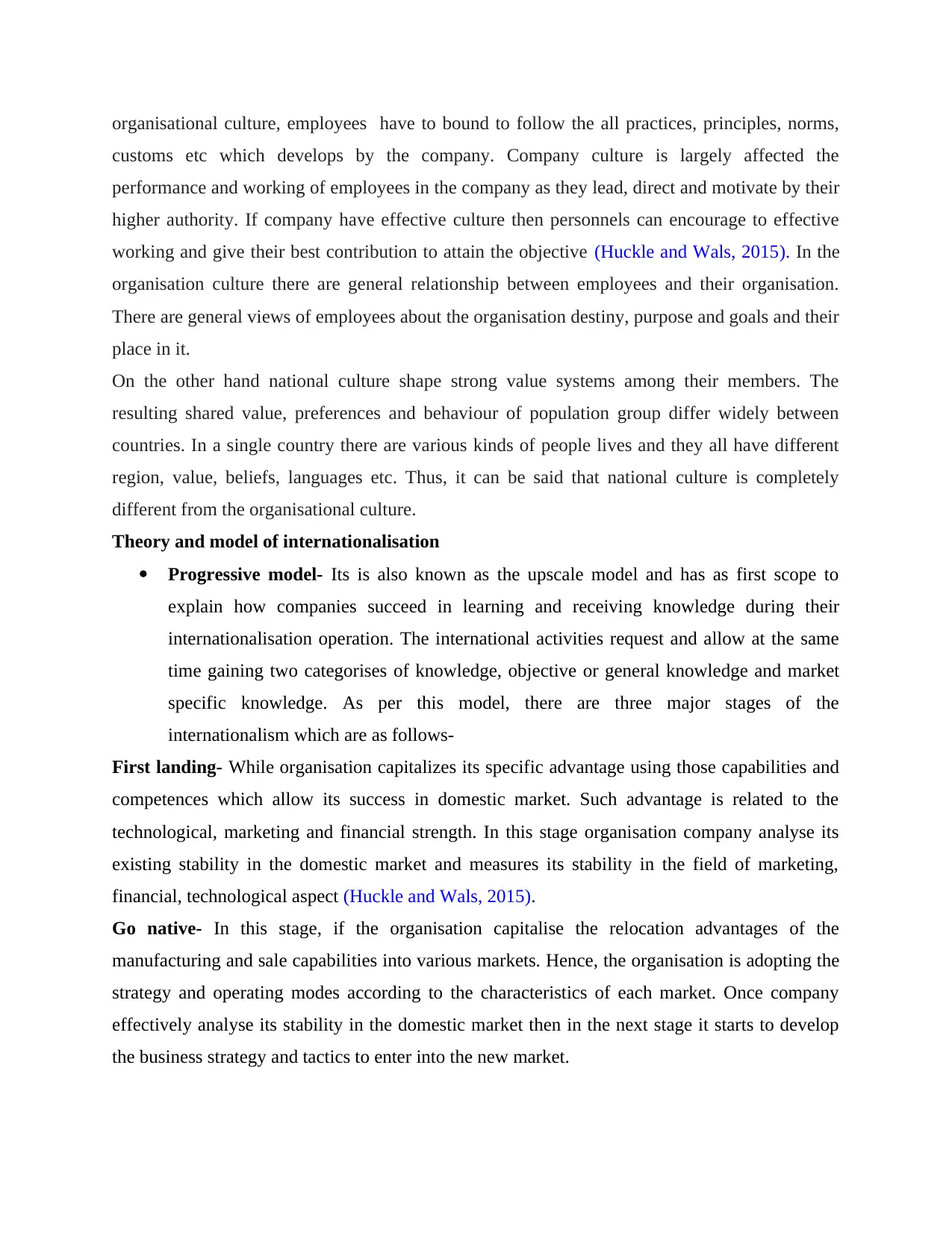
organisational culture, employees have to bound to follow the all practices, principles, norms,
customs etc which develops by the company. Company culture is largely affected the
performance and working of employees in the company as they lead, direct and motivate by their
higher authority. If company have effective culture then personnels can encourage to effective
working and give their best contribution to attain the objective (Huckle and Wals, 2015). In the
organisation culture there are general relationship between employees and their organisation.
There are general views of employees about the organisation destiny, purpose and goals and their
place in it.
On the other hand national culture shape strong value systems among their members. The
resulting shared value, preferences and behaviour of population group differ widely between
countries. In a single country there are various kinds of people lives and they all have different
region, value, beliefs, languages etc. Thus, it can be said that national culture is completely
different from the organisational culture.
Theory and model of internationalisation
Progressive model- Its is also known as the upscale model and has as first scope to
explain how companies succeed in learning and receiving knowledge during their
internationalisation operation. The international activities request and allow at the same
time gaining two categorises of knowledge, objective or general knowledge and market
specific knowledge. As per this model, there are three major stages of the
internationalism which are as follows-
First landing- While organisation capitalizes its specific advantage using those capabilities and
competences which allow its success in domestic market. Such advantage is related to the
technological, marketing and financial strength. In this stage organisation company analyse its
existing stability in the domestic market and measures its stability in the field of marketing,
financial, technological aspect (Huckle and Wals, 2015).
Go native- In this stage, if the organisation capitalise the relocation advantages of the
manufacturing and sale capabilities into various markets. Hence, the organisation is adopting the
strategy and operating modes according to the characteristics of each market. Once company
effectively analyse its stability in the domestic market then in the next stage it starts to develop
the business strategy and tactics to enter into the new market.
customs etc which develops by the company. Company culture is largely affected the
performance and working of employees in the company as they lead, direct and motivate by their
higher authority. If company have effective culture then personnels can encourage to effective
working and give their best contribution to attain the objective (Huckle and Wals, 2015). In the
organisation culture there are general relationship between employees and their organisation.
There are general views of employees about the organisation destiny, purpose and goals and their
place in it.
On the other hand national culture shape strong value systems among their members. The
resulting shared value, preferences and behaviour of population group differ widely between
countries. In a single country there are various kinds of people lives and they all have different
region, value, beliefs, languages etc. Thus, it can be said that national culture is completely
different from the organisational culture.
Theory and model of internationalisation
Progressive model- Its is also known as the upscale model and has as first scope to
explain how companies succeed in learning and receiving knowledge during their
internationalisation operation. The international activities request and allow at the same
time gaining two categorises of knowledge, objective or general knowledge and market
specific knowledge. As per this model, there are three major stages of the
internationalism which are as follows-
First landing- While organisation capitalizes its specific advantage using those capabilities and
competences which allow its success in domestic market. Such advantage is related to the
technological, marketing and financial strength. In this stage organisation company analyse its
existing stability in the domestic market and measures its stability in the field of marketing,
financial, technological aspect (Huckle and Wals, 2015).
Go native- In this stage, if the organisation capitalise the relocation advantages of the
manufacturing and sale capabilities into various markets. Hence, the organisation is adopting the
strategy and operating modes according to the characteristics of each market. Once company
effectively analyse its stability in the domestic market then in the next stage it starts to develop
the business strategy and tactics to enter into the new market.
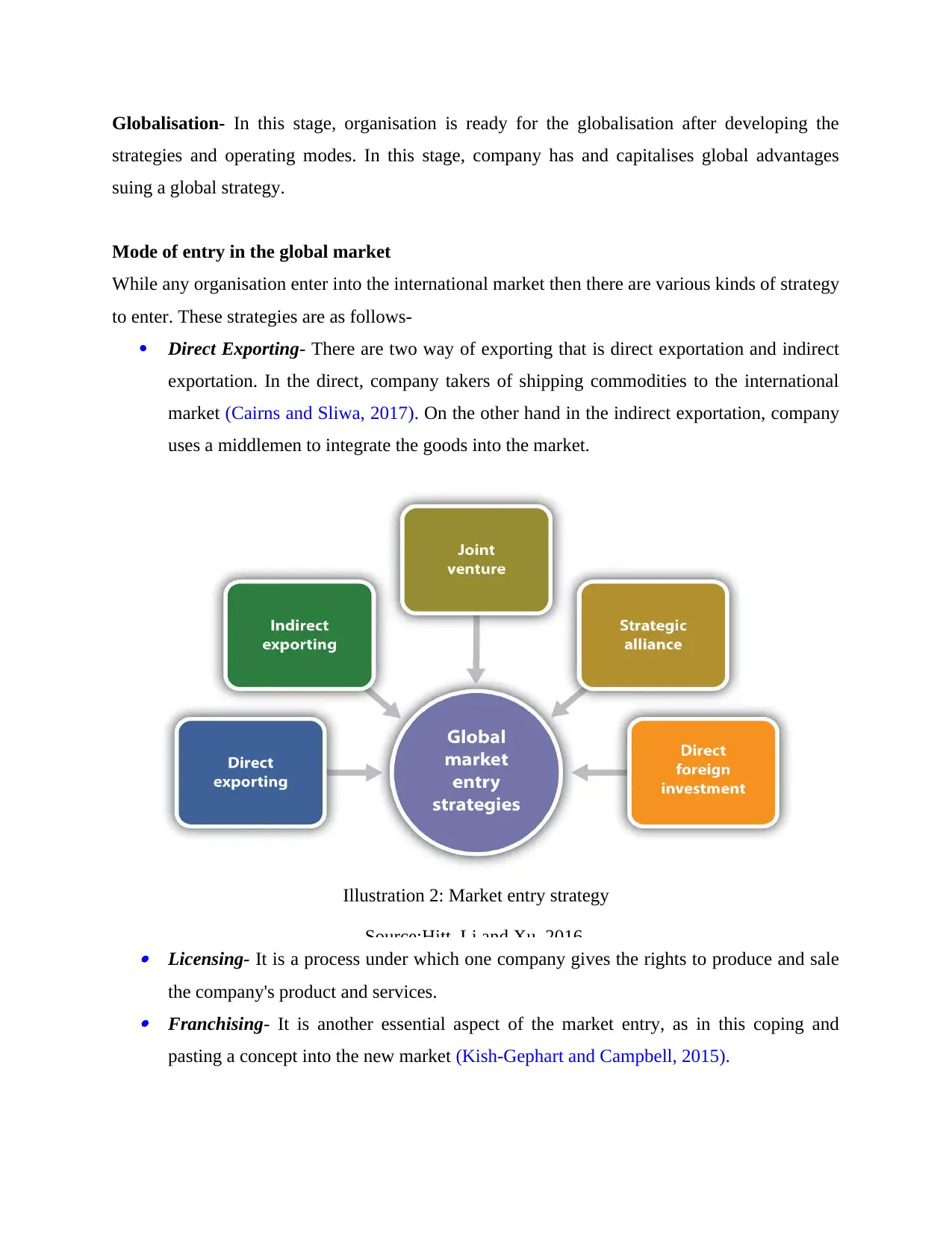
Globalisation- In this stage, organisation is ready for the globalisation after developing the
strategies and operating modes. In this stage, company has and capitalises global advantages
suing a global strategy.
Mode of entry in the global market
While any organisation enter into the international market then there are various kinds of strategy
to enter. These strategies are as follows-
Direct Exporting- There are two way of exporting that is direct exportation and indirect
exportation. In the direct, company takers of shipping commodities to the international
market (Cairns and Sliwa, 2017). On the other hand in the indirect exportation, company
uses a middlemen to integrate the goods into the market.
Licensing- It is a process under which one company gives the rights to produce and sale
the company's product and services. Franchising- It is another essential aspect of the market entry, as in this coping and
pasting a concept into the new market (Kish-Gephart and Campbell, 2015).
Illustration 2: Market entry strategy
Source:Hitt, Li and Xu, 2016.
strategies and operating modes. In this stage, company has and capitalises global advantages
suing a global strategy.
Mode of entry in the global market
While any organisation enter into the international market then there are various kinds of strategy
to enter. These strategies are as follows-
Direct Exporting- There are two way of exporting that is direct exportation and indirect
exportation. In the direct, company takers of shipping commodities to the international
market (Cairns and Sliwa, 2017). On the other hand in the indirect exportation, company
uses a middlemen to integrate the goods into the market.
Licensing- It is a process under which one company gives the rights to produce and sale
the company's product and services. Franchising- It is another essential aspect of the market entry, as in this coping and
pasting a concept into the new market (Kish-Gephart and Campbell, 2015).
Illustration 2: Market entry strategy
Source:Hitt, Li and Xu, 2016.
Secure Best Marks with AI Grader
Need help grading? Try our AI Grader for instant feedback on your assignments.
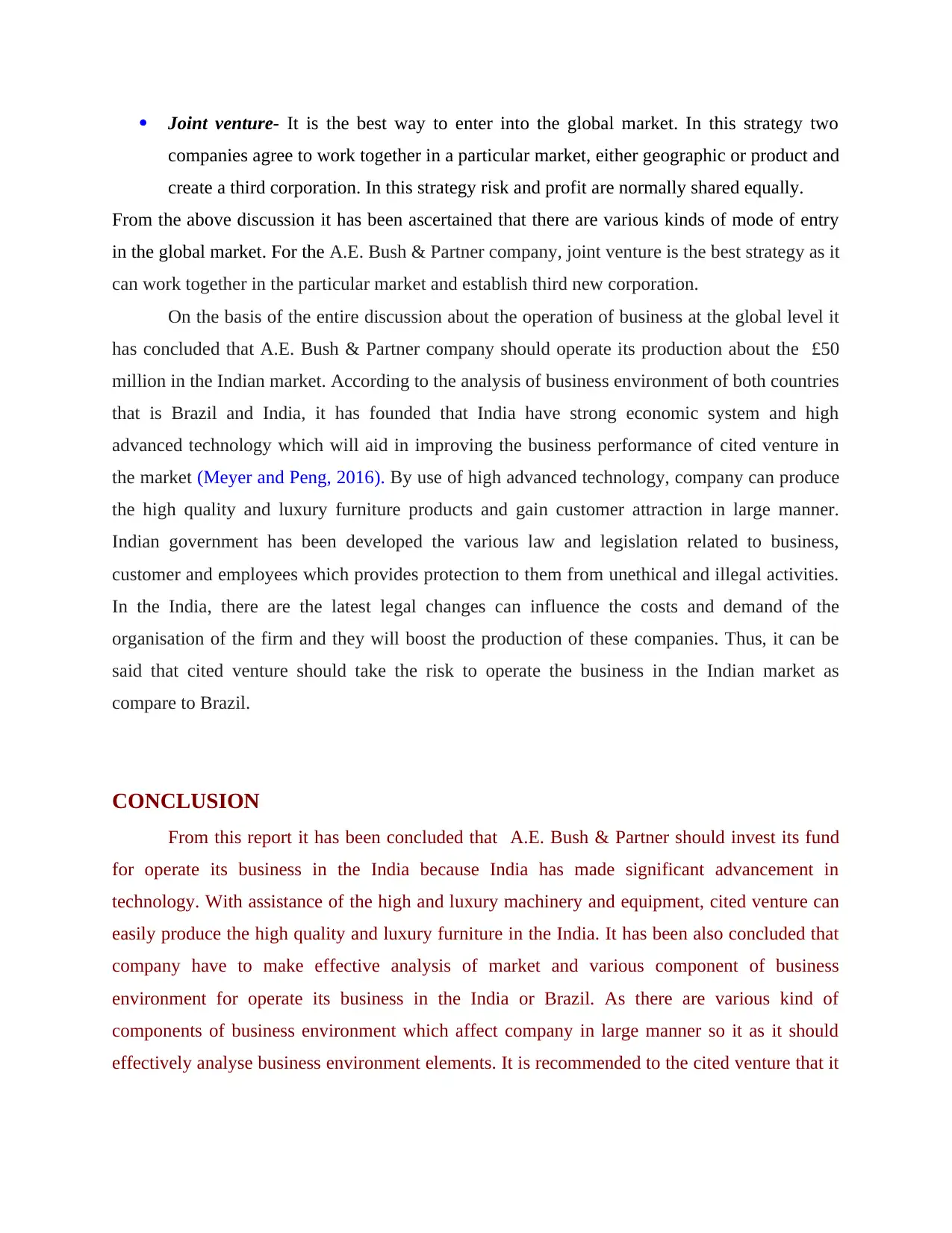
Joint venture- It is the best way to enter into the global market. In this strategy two
companies agree to work together in a particular market, either geographic or product and
create a third corporation. In this strategy risk and profit are normally shared equally.
From the above discussion it has been ascertained that there are various kinds of mode of entry
in the global market. For the A.E. Bush & Partner company, joint venture is the best strategy as it
can work together in the particular market and establish third new corporation.
On the basis of the entire discussion about the operation of business at the global level it
has concluded that A.E. Bush & Partner company should operate its production about the £50
million in the Indian market. According to the analysis of business environment of both countries
that is Brazil and India, it has founded that India have strong economic system and high
advanced technology which will aid in improving the business performance of cited venture in
the market (Meyer and Peng, 2016). By use of high advanced technology, company can produce
the high quality and luxury furniture products and gain customer attraction in large manner.
Indian government has been developed the various law and legislation related to business,
customer and employees which provides protection to them from unethical and illegal activities.
In the India, there are the latest legal changes can influence the costs and demand of the
organisation of the firm and they will boost the production of these companies. Thus, it can be
said that cited venture should take the risk to operate the business in the Indian market as
compare to Brazil.
CONCLUSION
From this report it has been concluded that A.E. Bush & Partner should invest its fund
for operate its business in the India because India has made significant advancement in
technology. With assistance of the high and luxury machinery and equipment, cited venture can
easily produce the high quality and luxury furniture in the India. It has been also concluded that
company have to make effective analysis of market and various component of business
environment for operate its business in the India or Brazil. As there are various kind of
components of business environment which affect company in large manner so it as it should
effectively analyse business environment elements. It is recommended to the cited venture that it
companies agree to work together in a particular market, either geographic or product and
create a third corporation. In this strategy risk and profit are normally shared equally.
From the above discussion it has been ascertained that there are various kinds of mode of entry
in the global market. For the A.E. Bush & Partner company, joint venture is the best strategy as it
can work together in the particular market and establish third new corporation.
On the basis of the entire discussion about the operation of business at the global level it
has concluded that A.E. Bush & Partner company should operate its production about the £50
million in the Indian market. According to the analysis of business environment of both countries
that is Brazil and India, it has founded that India have strong economic system and high
advanced technology which will aid in improving the business performance of cited venture in
the market (Meyer and Peng, 2016). By use of high advanced technology, company can produce
the high quality and luxury furniture products and gain customer attraction in large manner.
Indian government has been developed the various law and legislation related to business,
customer and employees which provides protection to them from unethical and illegal activities.
In the India, there are the latest legal changes can influence the costs and demand of the
organisation of the firm and they will boost the production of these companies. Thus, it can be
said that cited venture should take the risk to operate the business in the Indian market as
compare to Brazil.
CONCLUSION
From this report it has been concluded that A.E. Bush & Partner should invest its fund
for operate its business in the India because India has made significant advancement in
technology. With assistance of the high and luxury machinery and equipment, cited venture can
easily produce the high quality and luxury furniture in the India. It has been also concluded that
company have to make effective analysis of market and various component of business
environment for operate its business in the India or Brazil. As there are various kind of
components of business environment which affect company in large manner so it as it should
effectively analyse business environment elements. It is recommended to the cited venture that it
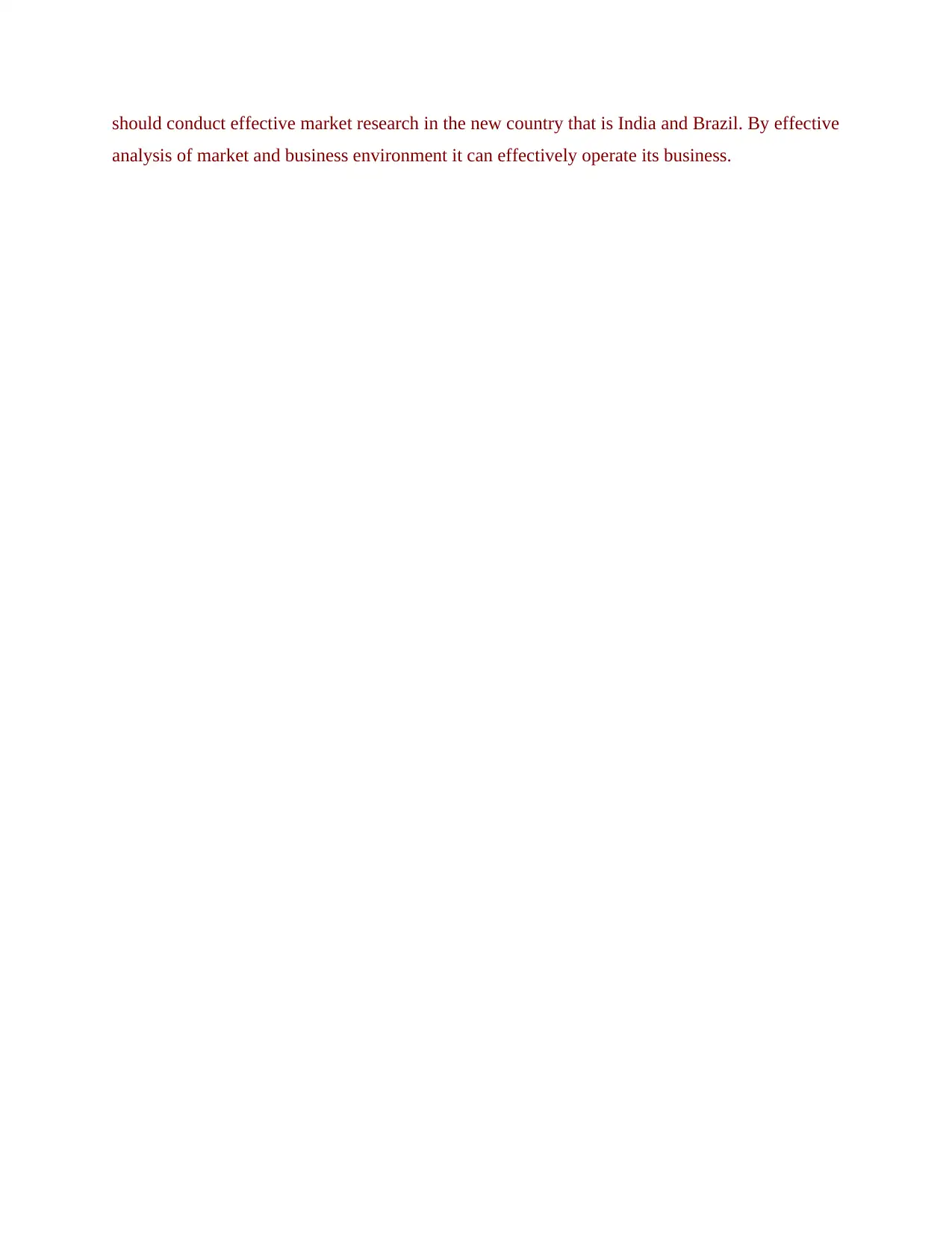
should conduct effective market research in the new country that is India and Brazil. By effective
analysis of market and business environment it can effectively operate its business.
analysis of market and business environment it can effectively operate its business.
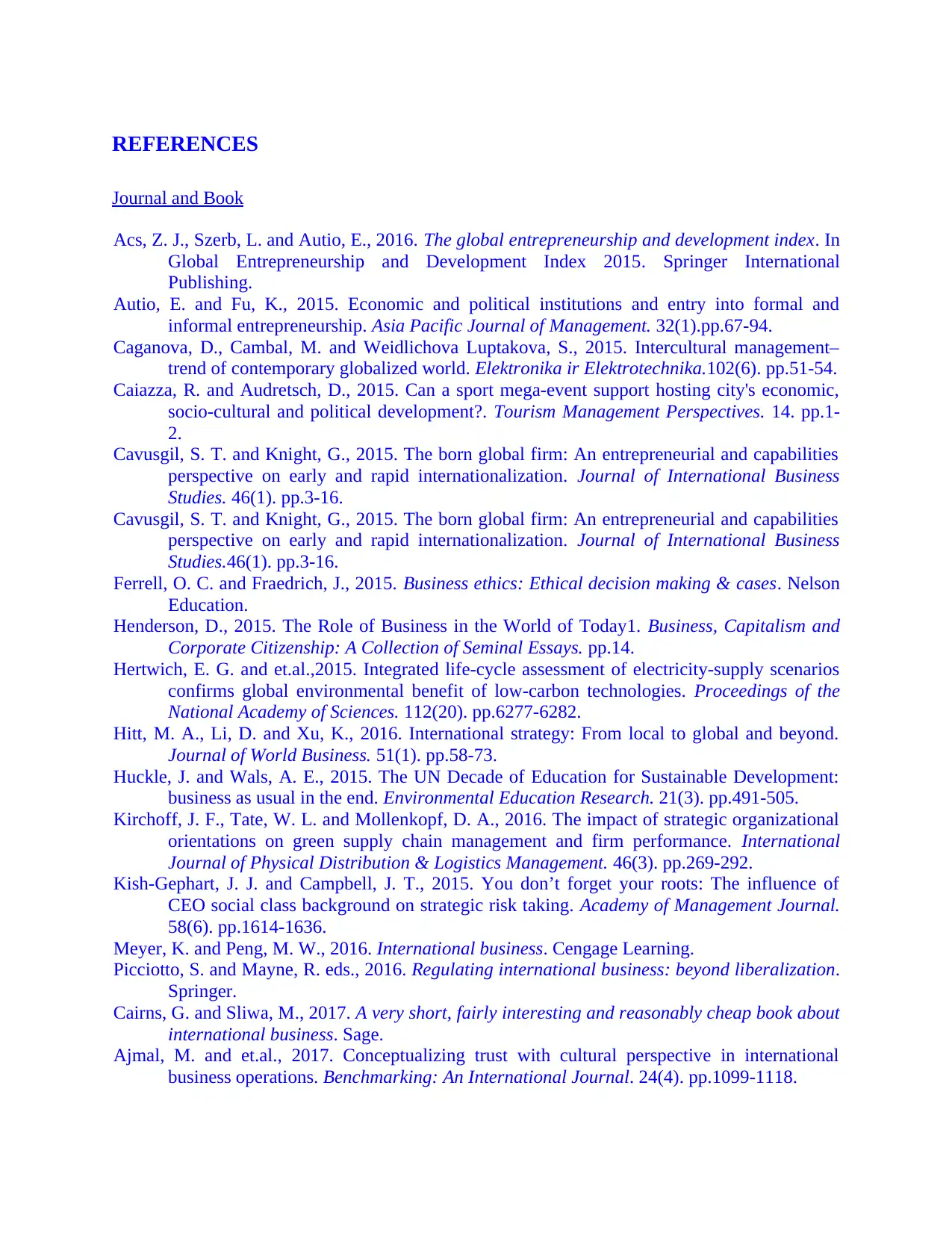
REFERENCES
Journal and Book
Acs, Z. J., Szerb, L. and Autio, E., 2016. The global entrepreneurship and development index. In
Global Entrepreneurship and Development Index 2015. Springer International
Publishing.
Autio, E. and Fu, K., 2015. Economic and political institutions and entry into formal and
informal entrepreneurship. Asia Pacific Journal of Management. 32(1).pp.67-94.
Caganova, D., Cambal, M. and Weidlichova Luptakova, S., 2015. Intercultural management–
trend of contemporary globalized world. Elektronika ir Elektrotechnika.102(6). pp.51-54.
Caiazza, R. and Audretsch, D., 2015. Can a sport mega-event support hosting city's economic,
socio-cultural and political development?. Tourism Management Perspectives. 14. pp.1-
2.
Cavusgil, S. T. and Knight, G., 2015. The born global firm: An entrepreneurial and capabilities
perspective on early and rapid internationalization. Journal of International Business
Studies. 46(1). pp.3-16.
Cavusgil, S. T. and Knight, G., 2015. The born global firm: An entrepreneurial and capabilities
perspective on early and rapid internationalization. Journal of International Business
Studies.46(1). pp.3-16.
Ferrell, O. C. and Fraedrich, J., 2015. Business ethics: Ethical decision making & cases. Nelson
Education.
Henderson, D., 2015. The Role of Business in the World of Today1. Business, Capitalism and
Corporate Citizenship: A Collection of Seminal Essays. pp.14.
Hertwich, E. G. and et.al.,2015. Integrated life-cycle assessment of electricity-supply scenarios
confirms global environmental benefit of low-carbon technologies. Proceedings of the
National Academy of Sciences. 112(20). pp.6277-6282.
Hitt, M. A., Li, D. and Xu, K., 2016. International strategy: From local to global and beyond.
Journal of World Business. 51(1). pp.58-73.
Huckle, J. and Wals, A. E., 2015. The UN Decade of Education for Sustainable Development:
business as usual in the end. Environmental Education Research. 21(3). pp.491-505.
Kirchoff, J. F., Tate, W. L. and Mollenkopf, D. A., 2016. The impact of strategic organizational
orientations on green supply chain management and firm performance. International
Journal of Physical Distribution & Logistics Management. 46(3). pp.269-292.
Kish-Gephart, J. J. and Campbell, J. T., 2015. You don’t forget your roots: The influence of
CEO social class background on strategic risk taking. Academy of Management Journal.
58(6). pp.1614-1636.
Meyer, K. and Peng, M. W., 2016. International business. Cengage Learning.
Picciotto, S. and Mayne, R. eds., 2016. Regulating international business: beyond liberalization.
Springer.
Cairns, G. and Sliwa, M., 2017. A very short, fairly interesting and reasonably cheap book about
international business. Sage.
Ajmal, M. and et.al., 2017. Conceptualizing trust with cultural perspective in international
business operations. Benchmarking: An International Journal. 24(4). pp.1099-1118.
Journal and Book
Acs, Z. J., Szerb, L. and Autio, E., 2016. The global entrepreneurship and development index. In
Global Entrepreneurship and Development Index 2015. Springer International
Publishing.
Autio, E. and Fu, K., 2015. Economic and political institutions and entry into formal and
informal entrepreneurship. Asia Pacific Journal of Management. 32(1).pp.67-94.
Caganova, D., Cambal, M. and Weidlichova Luptakova, S., 2015. Intercultural management–
trend of contemporary globalized world. Elektronika ir Elektrotechnika.102(6). pp.51-54.
Caiazza, R. and Audretsch, D., 2015. Can a sport mega-event support hosting city's economic,
socio-cultural and political development?. Tourism Management Perspectives. 14. pp.1-
2.
Cavusgil, S. T. and Knight, G., 2015. The born global firm: An entrepreneurial and capabilities
perspective on early and rapid internationalization. Journal of International Business
Studies. 46(1). pp.3-16.
Cavusgil, S. T. and Knight, G., 2015. The born global firm: An entrepreneurial and capabilities
perspective on early and rapid internationalization. Journal of International Business
Studies.46(1). pp.3-16.
Ferrell, O. C. and Fraedrich, J., 2015. Business ethics: Ethical decision making & cases. Nelson
Education.
Henderson, D., 2015. The Role of Business in the World of Today1. Business, Capitalism and
Corporate Citizenship: A Collection of Seminal Essays. pp.14.
Hertwich, E. G. and et.al.,2015. Integrated life-cycle assessment of electricity-supply scenarios
confirms global environmental benefit of low-carbon technologies. Proceedings of the
National Academy of Sciences. 112(20). pp.6277-6282.
Hitt, M. A., Li, D. and Xu, K., 2016. International strategy: From local to global and beyond.
Journal of World Business. 51(1). pp.58-73.
Huckle, J. and Wals, A. E., 2015. The UN Decade of Education for Sustainable Development:
business as usual in the end. Environmental Education Research. 21(3). pp.491-505.
Kirchoff, J. F., Tate, W. L. and Mollenkopf, D. A., 2016. The impact of strategic organizational
orientations on green supply chain management and firm performance. International
Journal of Physical Distribution & Logistics Management. 46(3). pp.269-292.
Kish-Gephart, J. J. and Campbell, J. T., 2015. You don’t forget your roots: The influence of
CEO social class background on strategic risk taking. Academy of Management Journal.
58(6). pp.1614-1636.
Meyer, K. and Peng, M. W., 2016. International business. Cengage Learning.
Picciotto, S. and Mayne, R. eds., 2016. Regulating international business: beyond liberalization.
Springer.
Cairns, G. and Sliwa, M., 2017. A very short, fairly interesting and reasonably cheap book about
international business. Sage.
Ajmal, M. and et.al., 2017. Conceptualizing trust with cultural perspective in international
business operations. Benchmarking: An International Journal. 24(4). pp.1099-1118.
Paraphrase This Document
Need a fresh take? Get an instant paraphrase of this document with our AI Paraphraser
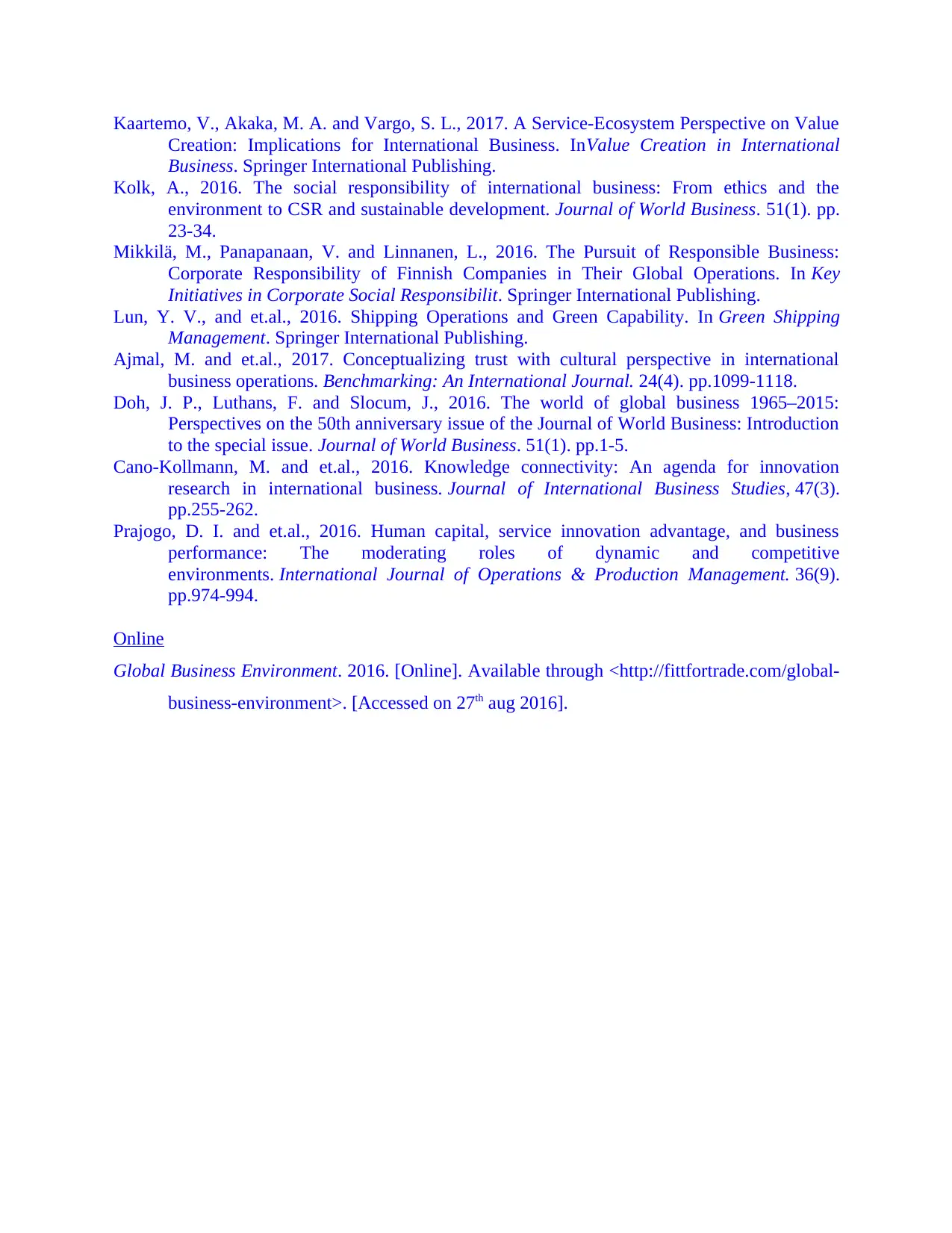
Kaartemo, V., Akaka, M. A. and Vargo, S. L., 2017. A Service-Ecosystem Perspective on Value
Creation: Implications for International Business. InValue Creation in International
Business. Springer International Publishing.
Kolk, A., 2016. The social responsibility of international business: From ethics and the
environment to CSR and sustainable development. Journal of World Business. 51(1). pp.
23-34.
Mikkilä, M., Panapanaan, V. and Linnanen, L., 2016. The Pursuit of Responsible Business:
Corporate Responsibility of Finnish Companies in Their Global Operations. In Key
Initiatives in Corporate Social Responsibilit. Springer International Publishing.
Lun, Y. V., and et.al., 2016. Shipping Operations and Green Capability. In Green Shipping
Management. Springer International Publishing.
Ajmal, M. and et.al., 2017. Conceptualizing trust with cultural perspective in international
business operations. Benchmarking: An International Journal. 24(4). pp.1099-1118.
Doh, J. P., Luthans, F. and Slocum, J., 2016. The world of global business 1965–2015:
Perspectives on the 50th anniversary issue of the Journal of World Business: Introduction
to the special issue. Journal of World Business. 51(1). pp.1-5.
Cano-Kollmann, M. and et.al., 2016. Knowledge connectivity: An agenda for innovation
research in international business. Journal of International Business Studies, 47(3).
pp.255-262.
Prajogo, D. I. and et.al., 2016. Human capital, service innovation advantage, and business
performance: The moderating roles of dynamic and competitive
environments. International Journal of Operations & Production Management. 36(9).
pp.974-994.
Online
Global Business Environment. 2016. [Online]. Available through <http://fittfortrade.com/global-
business-environment>. [Accessed on 27th aug 2016].
Creation: Implications for International Business. InValue Creation in International
Business. Springer International Publishing.
Kolk, A., 2016. The social responsibility of international business: From ethics and the
environment to CSR and sustainable development. Journal of World Business. 51(1). pp.
23-34.
Mikkilä, M., Panapanaan, V. and Linnanen, L., 2016. The Pursuit of Responsible Business:
Corporate Responsibility of Finnish Companies in Their Global Operations. In Key
Initiatives in Corporate Social Responsibilit. Springer International Publishing.
Lun, Y. V., and et.al., 2016. Shipping Operations and Green Capability. In Green Shipping
Management. Springer International Publishing.
Ajmal, M. and et.al., 2017. Conceptualizing trust with cultural perspective in international
business operations. Benchmarking: An International Journal. 24(4). pp.1099-1118.
Doh, J. P., Luthans, F. and Slocum, J., 2016. The world of global business 1965–2015:
Perspectives on the 50th anniversary issue of the Journal of World Business: Introduction
to the special issue. Journal of World Business. 51(1). pp.1-5.
Cano-Kollmann, M. and et.al., 2016. Knowledge connectivity: An agenda for innovation
research in international business. Journal of International Business Studies, 47(3).
pp.255-262.
Prajogo, D. I. and et.al., 2016. Human capital, service innovation advantage, and business
performance: The moderating roles of dynamic and competitive
environments. International Journal of Operations & Production Management. 36(9).
pp.974-994.
Online
Global Business Environment. 2016. [Online]. Available through <http://fittfortrade.com/global-
business-environment>. [Accessed on 27th aug 2016].
1 out of 14
Related Documents
Your All-in-One AI-Powered Toolkit for Academic Success.
+13062052269
info@desklib.com
Available 24*7 on WhatsApp / Email
![[object Object]](/_next/static/media/star-bottom.7253800d.svg)
Unlock your academic potential
© 2024 | Zucol Services PVT LTD | All rights reserved.




